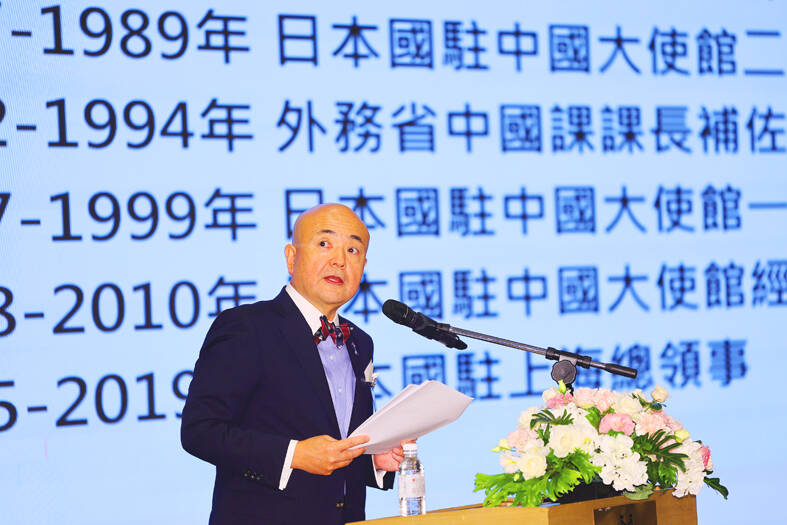A victory for presumptive Republican presidential candidate former US president Donald Trump would result in uncertainty in Asia, but not fundamentally change competition between the US and China, Japan’s top diplomat in Taiwan Kazuyuki Katayama said yesterday.
Katayama, chief representative of the Japan-Taiwan Exchange Association’s Taipei Office, made the remark during a meeting of the Third Wednesday Club in Taipei, hours after Trump was asked in an interview with Bloomberg whether the US would defend Taiwan and he suggested that Taipei should pay for defense.
The club’s membership is limited to the top 100 firms in each sector of the Taiwanese economy.

Photo: CNA
The US’ increasingly hardline stance toward Beijing stems from a bipartisan consensus in Washington, not the opinions of one person or party, he said.
Expectations as to what would happen if Trump were to win differ, with some voicing concern that the real-estate mogul would take a transactional approach and try striking a bargain with China over Taiwan, while others believe he would continue US President Joe Biden’s policies of competing against Beijing, he said.
No matter whether Trump or Biden wins, the rivalry between the US and China is unlikely to change, Katayama said.
Under conditions in which the US and China are competing, Japan’s foreign affairs strategy would be based on its need to balance the economic and cultural benefits of doing business with Beijing and protecting national security, he said.
This requires Tokyo to have no illusions regarding China’s motives, take measures to avoid misunderstanding and possess sufficient capabilities to counter adventurism from Beijing, Katayama said.
Chinese National Association of Industry and Commerce chairman Thomas Wu (吳東亮) said on the sidelines of the event that a resurgence of protectionism under Trump might lead to inflation in Taiwan.
Taiwan cannot dismiss the possibility that if Trump were to return to the White House, he might launch a tariff war capable of driving up inflation and sending the global economy into a downturn, he said.
Acer Inc CEO Jason Chen (陳俊聖) said that his company would buy chips from whichever sources were at hand, be it Taiwan or the US.
The Taiwanese semiconductor industry owes its successful development to government policy, the sector’s resilience, the hard work of talented people and careful cost management, club chairman Lin Por-fong (林伯豐) said.
These conditions cannot be easily replicated in foreign countries, he said, adding that Taiwan needs to monitor the US presidential election’s impact on cross-strait relations.
Taishin Securities Investment Advisory Co vice president Huang Wen-ching (黃文清) said given that Trump’s chance to win the US election is pretty high now, many of his policies and stances could be implemented.
“There is some level of concern priced in, though I won’t say there’s a panic,” he told Bloomberg.

Taipei, New Taipei City, Keelung and Taoyuan would issue a decision at 8pm on whether to cancel work and school tomorrow due to forecasted heavy rain, Keelung Mayor Hsieh Kuo-liang (謝國樑) said today. Hsieh told reporters that absent some pressing reason, the four northern cities would announce the decision jointly at 8pm. Keelung is expected to receive between 300mm and 490mm of rain in the period from 2pm today through 2pm tomorrow, Central Weather Administration data showed. Keelung City Government regulations stipulate that school and work can be canceled if rain totals in mountainous or low-elevation areas are forecast to exceed 350mm in

TRAFFIC SAFETY RULES: A positive result in a drug test would result in a two-year license suspension for the driver and vehicle, and a fine of up to NT$180,000 The Ministry of Transportation and Communications is to authorize police to conduct roadside saliva tests by the end of the year to deter people from driving while under the influence of narcotics, it said yesterday. The ministry last month unveiled a draft of amended regulations governing traffic safety rules and penalties, which included provisions empowering police to conduct mandatory saliva tests on drivers. While currently rules authorize police to use oral fluid testing kits for signs of drug use, they do not establish penalties for noncompliance or operating procedures for officers to follow, the ministry said. The proposed changes to the regulations require

EVA Airways president Sun Chia-ming (孫嘉明) and other senior executives yesterday bowed in apology over the death of a flight attendant, saying the company has begun improving its health-reporting, review and work coordination mechanisms. “We promise to handle this matter with the utmost responsibility to ensure safer and healthier working conditions for all EVA Air employees,” Sun said. The flight attendant, a woman surnamed Sun (孫), died on Friday last week of undisclosed causes shortly after returning from a work assignment in Milan, Italy, the airline said. Chinese-language media reported that the woman fell ill working on a Taipei-to-Milan flight on Sept. 22

1.4nm WAFERS: While TSMC is gearing up to expand its overseas production, it would also continue to invest in Taiwan, company chairman and CEO C.C. Wei said Taiwan Semiconductor Manufacturing Co (TSMC) has applied for permission to construct a new plant in the Central Taiwan Science Park (中部科學園區), which it would use for the production of new high-speed wafers, the National Science and Technology Council said yesterday. The council, which supervises three major science parks in Taiwan, confirmed that the Central Taiwan Science Park Bureau had received an application on Friday from TSMC, the world’s largest contract chipmaker, to commence work on the new A14 fab. A14 technology, a 1.4 nanometer (nm) process, is designed to drive artificial intelligence transformation by enabling faster computing and greater power